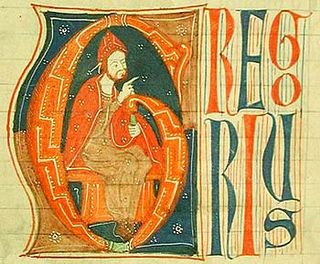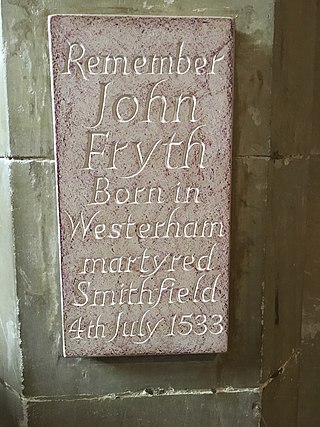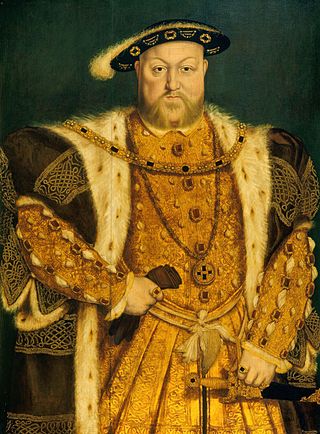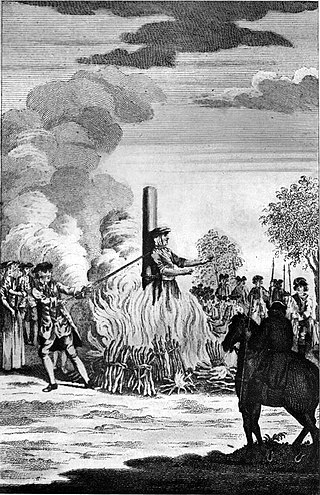Related Research Articles

The Medieval Inquisition was a series of Inquisitions from around 1184, including the Episcopal Inquisition (1184–1230s) and later the Papal Inquisition (1230s). The Medieval Inquisition was established in response to movements considered apostate or heretical to Roman Catholicism, in particular Catharism and Waldensians in Southern France and Northern Italy. These were the first movements of many inquisitions that would follow.

Thomas Cranmer was a leader of the English Reformation and Archbishop of Canterbury during the reigns of Henry VIII, Edward VI and, for a short time, Mary I. He helped build the case for the annulment of Henry's marriage to Catherine of Aragon, which was one of the causes of the separation of the English Church from union with the Holy See. Along with Thomas Cromwell, he supported the principle of royal supremacy, in which the king was considered sovereign over the Church within his realm.

John Rogers was an English clergyman, Bible translator and commentator. He guided the development of the Matthew Bible in vernacular English during the reign of Henry VIII and was the first English Protestant executed as a heretic under Mary I, who was determined to restore Roman Catholicism.

Nicholas Ridley was an English Bishop of London. Ridley was one of the Oxford Martyrs burned at the stake during the Marian Persecutions, for his teachings and his support of Lady Jane Grey. He is remembered with a commemoration in the calendar of saints in some parts of the Anglican Communion on 16 October.

John Roy Hooper was an English churchman, Anglican Bishop of Gloucester, later of Worcester and Gloucester, a Protestant reformer and a Protestant martyr. A proponent of the English Reformation, he was executed for heresy by burning during the reign of Queen Mary I.
Edward Wightman was an English radical Anabaptist minister, executed at Lichfield on charges of heresy; he was the last person to be burned at the stake in England for such a crime.

John Frith was an English Protestant priest, writer, and martyr.

Rowland Taylor was an English Protestant martyr during the Marian Persecutions.

Anne Askew, married name Anne Kyme, was an English writer, poet, and Protestant preacher who was condemned as a heretic during the reign of Henry VIII of England. She and Margaret Cheyne are the only women on record known to have been both tortured in the Tower of London and burnt at the stake.
John Ponet, sometimes spelled John Poynet, was an English Protestant churchman and controversial writer, the bishop of Winchester and Marian exile. He is now best known as a resistance theorist who made a sustained attack on the divine right of kings.
Eythorne Baptist Church originated in the meetings of early 16th century Baptists who had crossed the English Channel from the low countries to Kent to escape persecution. Nineteenth-century Baptist writer J. J. Goadby named Eythorne as one of the three "most ancient Baptist churches in England".
Events from the 1550s in England. This decade marks the beginning of the Elizabethan era.
John Capon, was a Benedictine monk who became bishop of Bangor, then bishop of Salisbury under Henry VIII. He is often referred to as John Salcot alias Capon.

The English Reformation took place in 16th-century England when the Church of England was forced by its monarchs and elites to break away from the authority of the pope and the Catholic Church. These events were part of the wider European Reformation, a religious and political movement that affected the practice of Christianity in Western and Central Europe.

Heresy is any belief or theory that is strongly at variance with established beliefs or customs, particularly the accepted beliefs or religious law of a religious organization. A heretic is a proponent of heresy.
Bocher is a surname. Notable people with the surname include:
Anabaptists did not originate in England, but came from continental Europe to escape persecution from Switzerland. English Anabaptism did not touch the country as quickly as other countries since Henry VIII wanted to eradicate heresy quickly and wanted to push a unified religion in England. In fact, during his rule in 1535, Henry VIII had them deported out of England officially with a proclamation that, "Ordered Anabaptists to leave the realm within twelve days after parliament adjourned or suffer the penalty of death." In 1539 he pardoned Anabaptists with a similar proclamation to restore them to the Roman Catholic church. He wanted unity above all. While Henry VIII had broken away from the Catholic Church himself, Anabaptists did not face a welcoming country from the beginning of their coming to England. Both Henry and his Tudor successors have charged dissidents on the basis of Anabaptism, some of whom had not such convictions. Looking at primary sources, this means that just because they were charged as an Anabaptist does not mean they were one.

In England, burning was a legal punishment inflicted on women found guilty of high treason, petty treason, and heresy. Over a period of several centuries, female convicts were publicly burnt at the stake, sometimes alive, for a range of activities including coining and mariticide.
References
- 1 2 Andrew Hope, Joan Bocher in Oxford Dictionary of National Biography (2004)
- ↑ Benjamin Evans, The Early English Baptists (London 1864) quoting Gilbert Burnet's History of the Reformation (1682)
- ↑ William Wordsworth, Edward signing the warrant for the execution of Joan of Kent